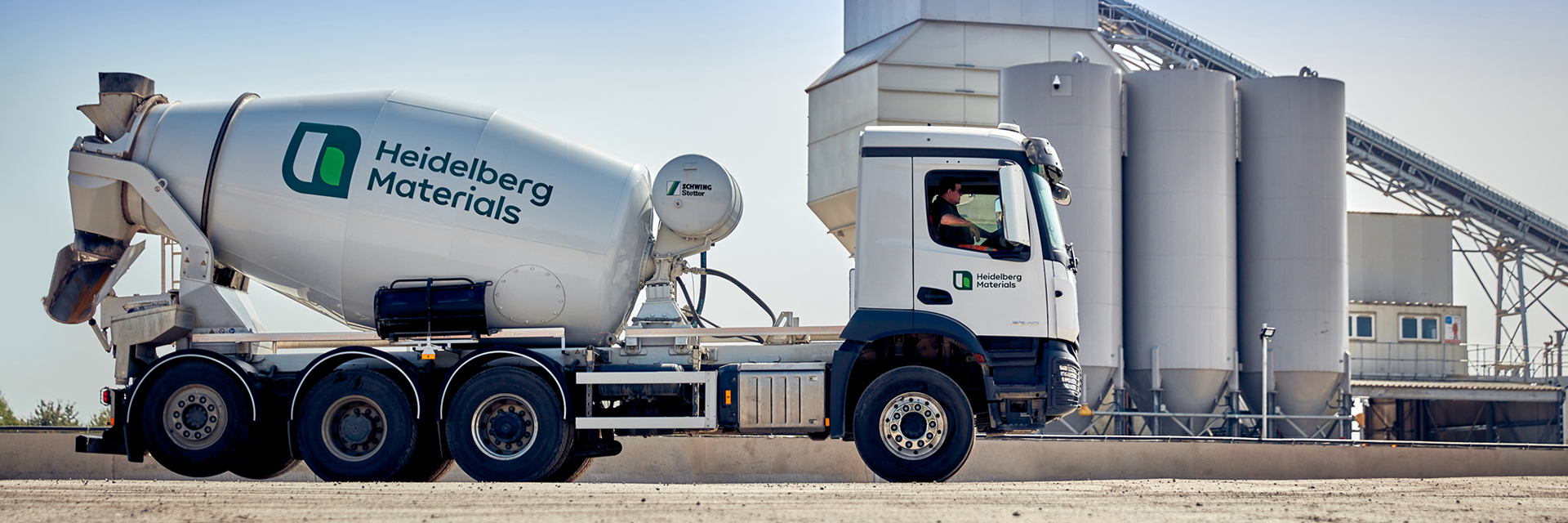Roller compacted concrete (RCC)
Roller compacted concrete (RCC) is a construction product using a stiff, no-slump concrete mix that's laid and compacted with rollers. It’s used for applications like dams, heavy-duty pavements, and road bases, offering speed and cost-effectiveness.
RCC shares material constituents with traditional concrete, but is produced with a significantly lower water-to- cement ratio. The resulting mix is drier, meaning it gains strength quickly and can support heavy traffic loads soon after installation. Finished RCC surfaces can be tailored to the functional and aesthetic requirements of the site, with options including natural finishes, power floated, or brushed textures.
Our RCC can be produced on or near to site for rapid deployment, while reducing environmental impacts of transport and logistics. Please get in touch to understand the suitability of roller compacted concrete to your construction application.
Applications of roller compacted concrete
RCC is particularly suited for applications where durability, load-bearing capacity, and quick installation are required. The highly versatile concrete doesn’t require steel reinforcement, making it a particularly attractive option for sites with constrained construction windows or operational continuity requirements.
Roller compacted concrete is used across a variety of heavy-duty infrastructure and industrial applications, including:
Ports and harbours
For container terminals, quay surfaces, and loading zones where high structural strength and durability are essential.
Airports
Roller compacted concrete is ideal for runways, taxiways, and hardstanding areas subjected to repetitive, high-intensity loads.
Dams and reservoirs
With high compactibility and performance, as well as fast construction times, RCC is ideal for constructing dams and reservoirs.
Industrial yards
Sites requiring surfaces that can withstand frequent point loading, such as from containers, trailers, and forklifts, would benefit from RCC.
Highway infrastructure
The concrete is suitable for service roads, hard shoulders, lay-bys, and rest areas. RCC can also be used as a sub-base for asphalt overlays on roads, aligning with cost reduction strategies.
Logistics and distribution centres
From HGV parking and turning circles to internal roads requiring minimal maintenance and long service life, this concrete is a versatile solution for transport and logistics.
Military and mining sites
Roller compacted concrete is well-suited to locations demanding resistance to impact, abrasion, and heavy vehicular movement.
Benefits of roller compacted concrete
The structural behaviour of roller compacted concrete aligns with that of rigid concrete pavements. It offers high flexural, compressive, and shear strengths to support heavy and repeated loads without failure or deformation.
The production and compaction process ensures low permeability, which contributes to excellent long-term performance under various environmental conditions. These include freeze-thaw cycles and chemically aggressive environments.
RCC’s core performance benefits are enhanced by the following properties:
1. Quick installation process
Roller compacted concrete is favoured for high-output construction programmes that benefit from early trafficking and minimal curing time. Increasingly, it’s used in pavement construction, either as a standalone surface or in combination with asphalt overlays, particularly where cost-effectiveness and durability are critical.
Mobile RCC production allows for high-volume placement with minimal setup, making it ideal for both small- and large-scale projects. Its installation by paver and compaction method allows for faster project timelines and minimal disruption to ongoing operations.
2. Cost efficient
The elimination of formwork, rebar, and long curing times can significantly reduce construction costs and timeframes.
3. Resistance to abrasion and rutting
RCC resists surface wear and eliminates rutting, reducing long-term maintenance needs.
4. 100% recyclable
Roller compacted concrete is fully recyclable and can incorporate industrial by-products, like pulverized fly ash, to reduce the carbon footprint of the mix. Similarly, RCC can be produced on or near to site via mobile batching plants, helping to lower emissions associated with transport and ensure a reliable supply chain.
Thanks to a light surface colour, RCC mitigates heat island effects through a high solar reflectance index.
Contact details
Contact the team nearest to you using the details in the table below. Alternatively, please complete the contact form at the bottom of this page.
| Region | Telephone | Email address |
| Scotland | 0330 123 4627 | concretescotland@uk.heidelbergmaterials.com |
| North East | 0330 123 4628 | concretenortheast@uk.heidelbergmaterials.com |
| North West | 0330 123 4629 | concretenorthwest@uk.heidelbergmaterials.com |
| Central West | 0330 123 4631 | concretecentralwest@uk.heidelbergmaterials.com |
| Central East | 0330 123 4632 | concretecentraleast@uk.heidelbergmaterials.com |
| South West | 0330 123 3406 | concretesouthwest@uk.heidelbergmaterials.com |
| South Wales | 0330 123 3403 | concretesouthwales@uk.heidelbergmaterials.com |
| South East | 0330 123 4633 | concretesoutheast@uk.heidelbergmaterials.com |
| London | 0330 123 4635 | concretelondon@uk.heidelbergmaterials.com |
RCC FAQs
- Does RCC need steel reinforcement?
-
No, one of the many advantages of roller compacted concrete is its ability to be constructed rapidly, without the need for steel reinforcement. It’s a favourable option for sites with operational continuity requirements or constrained construction windows.
- Can you use roller compacted concrete for dams and reservoirs?
-
Yes, RCC is a popular choice for dam and reservoir construction. This is because the concrete offers:
- High compactability and performance
- Rapid construction times
- Lower costs than conventionally placed concrete dams
- What’s the cost of roller compacted concrete?
-
The cost of RCC depends on several factors, from the volume required to the timescales of the project. Our team can advise you on how much roller compacted concrete will cost for your construction application - please contact us.
- Where are roller compacted concrete batch plants in the UK?
-
Heidelberg Materials’s mobile plants produce roller compacted concrete around the UK. We also have a mobile batching plant that can be deployed on-site through our contracting team. Find out more by viewing our contracting services.


